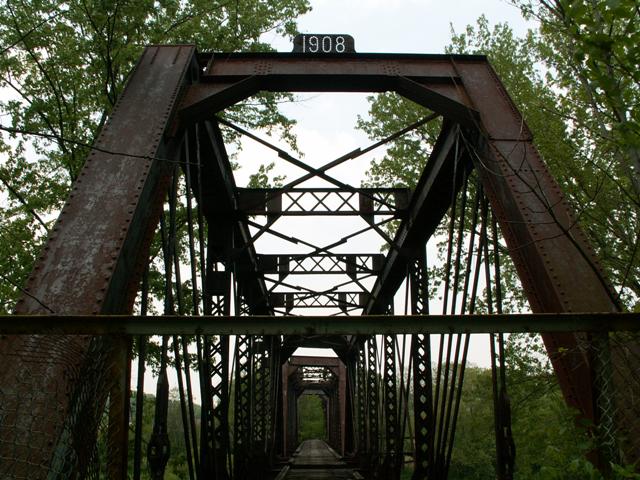We Recommend:
Bach Steel - Experts at historic truss bridge restoration.
BridgeHunter.com Phase 1 is released to the public! - Visit Now
Center Village Railroad Bridge

Primary Photographer(s): Nathan Holth
Bridge Documented: May 27, 2007
Railroad (Abandoned Delaware and Hudson Railroad) Over Susquehanna River
Center Village: Broome County, New York: United States
Not Available or Not Applicable
Not Available
Not Available
Not Available
3 Main Span(s)
Not Applicable

View Information About HSR Ratings
Bridge Documentation
This is a three span railroad truss bridge on a long-abandoned railroad line. The bridge shows some signs of alteration, including replaced turnbuckles and overhead lateral bracing. Cantilevers from a sidewalk or outlook that existed at least on at least part of the bridge remain on the structure. A 1908 "plaque" is present on top of the portal bracing, but no builder is shown.
There has been talk of creating a rail-trail on this line. If this does materialize, it is important that the historic integrity of the historic bridge be maintained during the conversion to a trail, including the use of railings that do not obstruct the view of the historic structure.
Gordon A. Davids, P.E. provided HistoricBridges.org with the following extensive discussion about this bridge:
The Delaware and Hudson Railroad designation for this bridge was Bridge 3.15, located at Center Village, NY. It is 3.15 miles south of Nineveh Junction, on the Nineveh Branch of the former Pennsylvania
Division of the D&H. Even though the mileposts on the Nineveh Branch were based on milepost 0 at Albany, the bridges were numbered from a mile 0 at Nineveh.
The Nineveh Branch on Bridge 3.15 was removed about 20 years ago, after the
D&H acquired the former DL&W line from Binghamton to Scranton and clearances were improved in Belden Tunnel. Before that time, this was a route for high and wide shipments, typically from GE at Schenectady to the Erie at Jefferson Jct, and
other railroad interchanges at Scranton and Wilkes-Barre. The D&H continued south of Jefferson Jct on the former Erie Jefferson Division to West Carbondale, and beyond to Wilkes-Barre on the D&H Pennsylvania Division.
The "lookouts"
carried the telegraph, telephone and signal wires. There was never a walkway or roadway on the outside of the trusses.
An interesting feature is the non-symmetrical trusses. The east truss is heavier than the west truss, to
accommodate the possibility of adding a second track on the east side. The present east truss would then become the center truss, carrying loads from both tracks. That presented a problem in later years, because the trusses did not deflect
equally under load, causing "racking" of the floor beams and truss lateral bracing.
Sometime before I came to the D&H Engineering Dept. in 1966, they had run a strain gauge analysis on the bridge. That is probably the reason the
turnbuckles were installed to equalize stresses in the eyebars. We found it very difficult to calculate an accurate rating on the trusses because of the non-linear behavior of the eyebar stresses. However, we were confident in permitting
315,000 lb cars on the route, along with any special heavy dimensional loads. Those included steam turbines from GE on the GEX 80000 series cars that weighed well over one million pounds.
![]()
Photo Galleries and Videos: Center Village Railroad Bridge
Bridge Photo-Documentation
A collection of overview and detail photos. This photo gallery contains a combination of Original Size photos and Mobile Optimized photos in a touch-friendly popup viewer.Alternatively, Browse Without Using Viewer
![]()
Maps and Links: Center Village Railroad Bridge
Coordinates (Latitude, Longitude):
Search For Additional Bridge Listings:
Bridgehunter.com: View listed bridges within 0.5 miles (0.8 kilometers) of this bridge.
Bridgehunter.com: View listed bridges within 10 miles (16 kilometers) of this bridge.
Additional Maps:
Google Streetview (If Available)
GeoHack (Additional Links and Coordinates)
Apple Maps (Via DuckDuckGo Search)
Apple Maps (Apple devices only)
Android: Open Location In Your Map or GPS App
Flickr Gallery (Find Nearby Photos)
Wikimedia Commons (Find Nearby Photos)
Directions Via Sygic For Android
Directions Via Sygic For iOS and Android Dolphin Browser
USGS National Map (United States Only)
Historical USGS Topo Maps (United States Only)
Historic Aerials (United States Only)
CalTopo Maps (United States Only)

